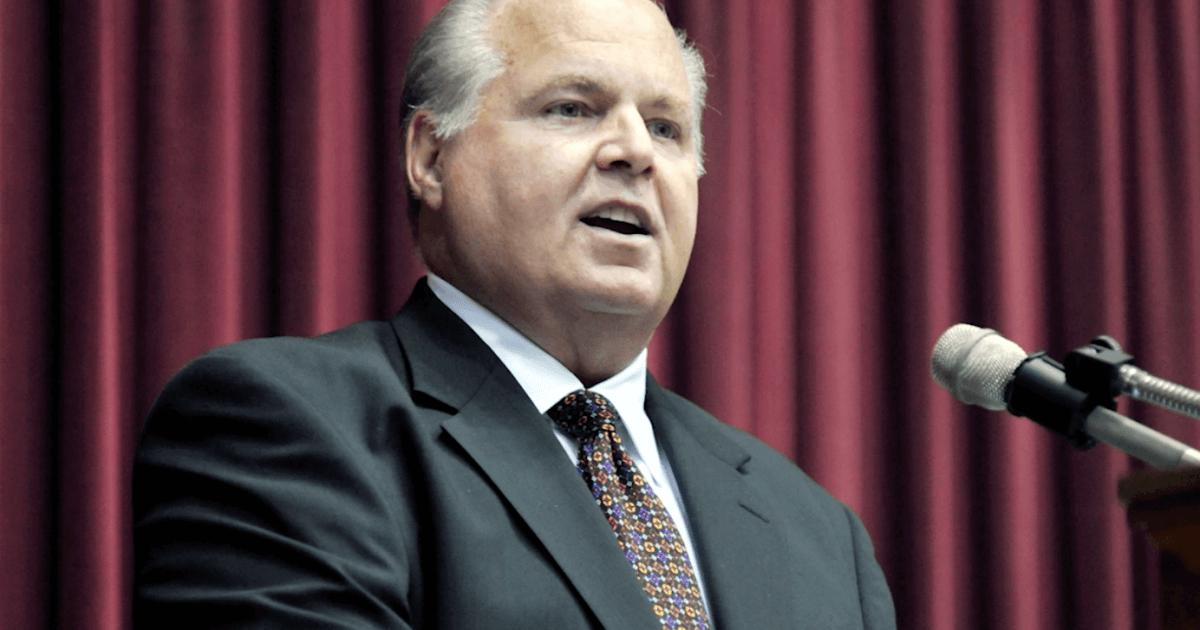“The temptation here is to start divulging a lot of stuff, [but] I'm not gonna do that because I vowed not to be a cancer patient on the radio,” says political news correspondent Rush Limbaugh, who has been quiet about his battle with advanced lung cancer. Now, the television personality is giving a long anticipated update on his health and treatment.
Limbaugh, 69, revealed that he had been diagnosed with advanced lung cancer on his radio program “The Rush Limbaugh Show in February, but hasn’t shared many health updates with fans. However, that’s seems to have changed. While speaking to an audience, Limbaugh announced that he was starting his third wave of lung cancer treatment, and despite being in good spirits, it’s been challenging.
Read More“Every day I wake up and the first thing I do is thank God that I did,” Limbaugh says. “Just waking up is a blessing. I know many of you are praying daily and nightly, [and] I happen to believe that they work. I believe that they are sustaining me. I pray for the energy to be able to do this…as to how the treatment is going I'm still here and that's all that's important.”
Immunotherapy For Advanced Lung Cancer
Developments in lung cancer research has led to new treatment options available to patients. Immunotherapy harnesses the power of your immune system to fight the cancer, and it’s been proven to be a revolutionary treatment option for lung cancer patients. It may be an option for advanced lung cancer depending on the characteristics of the tumor and how it interacts with one’s immune system. Immunotherapy works for between 25% to 35% percent of people with the disease.
Related: What Late Stage Lung Cancer Patients Should Know About Immunotherapy During Coronavirus
“We do know within several months of treatment whether [immunotherapy] going to work or not,” Dr. Ken Miller, Director of Outpatient Oncology at the University of Maryland, Greenebaum Cancer Center, tells SurvivorNet. “When it does work, it may work really, really well. We see the white blood cells essentially going to the sites of tumor and killing cancer cells. So immunotherapy certainly has a role if we find that you have advanced lung cancer, definitely is having a growing role if we find you have stage 3 lung cancer.”
Genetics For Late Stage Lung Cancer
In cases of late stage lung cancer, examining and understanding molecular tumors of the disease can be critical in determining the best treatment options. Thanks to advancements in research, doctors can test for hundreds of genes that play a role in how your cancer develops and spreads, and many of these genetic changes can be targeted with available medications. The more targeted the therapy is, the lower the risk for side effects and any type of collateral damage such as hair loss during treatment.
Related: How Genetic Testing Determines Treatment in Lung Cancer
Lung cancer can be a tricky disease to treat since it can become immune to the effects of a targeted treatment. However, if patients regularly undergo checkups so doctors can genetically analyze their tumors, new targeted therapies will be available.
The Importance Of Catching Lung Cancer Early
Identifying genetics in lung cancer can not only open treatment options, but assess the genetic risk of a lung cancer diagnosis. Lung cancer survivor Amanda Kouri was one of the lucky cases where doctors caught her diagnosis early, and now she’s using her experience to advocate for new detection methods. When caught in the later stages, lung cancer can be an extremely difficult to treat.
Lung cancer survivor Amanda Kouri on why she advocates for early detection
“The reason why lung cancer is so deadly is because it’s caught so late,” Kouri tells SurvivorNet. “We assume that everyone smokes, or we assume that it only happens to 65-year-old people, but it’s really a terrible disease that can take anyone, at any age, any gender, any race.”
Learn more about SurvivorNet's rigorous medical review process.

